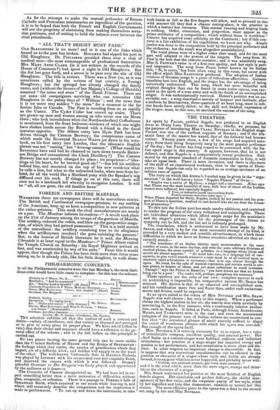PHILHARMONIC CONCERTS.
IF all the Philharmonic concerts were like last Monday's, the most fasti- dious critic would have little cause to complain : for this was the scheme.
ACT I.
Sinfonia in C Minor, No.5 HATDN.
Recitative, •• And lie journeyed" Msworrasostrr
(St Paul) miss S. FiLoWER Air, • But the Lord is mindful" BARTEOLDY.
Concerto Pianoforte in F Minor, Madame DoLcesis Coons.
Scene, Miss Ettarearn. " Love, bow mighty" (Faust) SPuNR. Overture, Der Berggeist Spotlit.
ACT P.
Sinfonia, Eroica BEETHOVEN. Recitative. 'Tis raging noon"
Mr. HOBBS. HAYDN.
Air, " Distressful nature '• (The Seasons) Duette, Miss HAINFORTII and Miss S. Fr.owra, " Ebben a to ferisce " (Semeramide) Overture, Les Dais Journees. Bonita.
CHTRUBINT.
Leader. Mr. T. Coosa- Conductor. Mr. Parma.
This selection exhibits all that the auditor of such a concert can desire—variety of excellence, and that variety so disposed and arranged as to give to every piece its proper place. We have asked (often in vain) that their choice and sequence should have a reference to the ge- neral effect of the scheme ; and in the bill before us this principle is carried out.
No two pieces bearing the same general title can be more unlike than the C minor Sinfonia of HAYDN and the Eroica of BEETHOVEN : the feelings which they excite, the species of gratification which they impart, are of a different kind ; and neither will supply to us the want of the other. The well-known Violoncello Solo in HAYDN'S Sinfonia was played by LINDLEY with his accustomed ease and exquisite finish, and deserved the encore with which it was followed. SPOHR'S splendid Overture to Der Bergyvist was finely played, and appreciated by the audience as it deserves. The Concerto of CHOPIN disappointed us. We had been led to ex- pect something better than a mere succession of difficulties, without plan, congruity, or cohesion. There is a passage in FoiniEL's Life of SEBASTIAN Rawl, which occurred to our minds while hearing it, and which will accurately describe the composition and the impression it made in performance. " To run up and down the instrument, to take both hands as full as the five fingers will allow, and to proceed in this wild manner till they find a chance resting-place, is the practice to which a learner has recourse. This eternal running and leaping leads to nothing. Order, connexion, and proportion, must appear as the prime attributes of a composition ; which without these is worthless." CHOPIN has acquired some celebrity on the Continent ; but if this con- certo is a fair exhibition of his capabilities, we know not why. Ample justice was done to the composition both by the principal performer and the orchestra ; but the result was altogether unsatisfactory. The vocal pieces were of a higher order than usual, and for the most part well adapted to the powers of the singers. The song from St. Paul is the best that the oratorio contains ; and it was admirably sung. Miss S. FLowsn's voice is of a first-rate quality, and her style is pure and impressive. The song from Faust, better known by its Italian title, " Si, lo sento," has been often sung in this room, but never with the effect which Miss RAINFORTH produced. The adoption of Italian versions of German songs is a piece of ridiculous affectation. German translates best into English, and the singer has the advantage of being universally understood. This song, which has more beautiful and original thoughts than can be found in some entire operas, was exe- cuted in the spirit of a true artist and with the finish of an accomplished singer. It was enthusiastically received. HOBBS'S position was an un- enviable one : a song descriptive merely of languor and lassitude, after a sinfonia by BEETHOVEN, three-quarters of an hour long, must in infe- rior hands have utterly failed: to the skill and finished expression of the singer, must, in this case, be ascribed the success of the song.


























 Previous page
Previous page